Chinese New Year – Few lines, Short Essay and Full Essay
Essays , Festivals 0
Last Updated on January 25, 2020

Few lines about Chinese New Year
- Chinese new year is also known as Lunar new year
- It is a Chinese festival celebrating the beginning of a new year of the Chinese calendar.
- In mainland china, the day marks the onset of spring and is referred as the Spring Festival.
- In 2020, the Chinese New Year is celebrated on 25th January and it’s a public holiday.
- This Chinese year is called the Year of the Rat.
Brief essay on Chinese New Year
Chinese New Year is a well-known Chinese festival that celebrates the beginning of a new year of the Chinese calendar. It is also known as lunar New Year or the Spring Festival as it marks the onset of spring. The first day of Chinese New Year begins on the new moon day that happens between 21 January and 20 February. In 2020 the Chinese New Year is celebrated on 25th January commencing the Year of the Rat. Chinese New Year is an important holiday in China and the festival is also celebrated worldwide in regions with significant Chinese populations.
Long Essay on Chinese New Year
Chinese New Year marks the beginning of a new year in the Chinese calendar. It is also termed as “Lunar New Year”, “Chinese New Year Festival”, and “Spring Festival”. Generally, the Chinese New Year falls on different dates every year in the Gregorian calendar. It is calculated based on the first new moon day that falls between 21th of January and 20th of February.
Chinese New Year celebrations starting from the New Year eve and ends with the Lantern festival that is held on the 15th day of the year. Chinese New Year is observed as a public holiday in china and in several countries with sizable Chinese and Korean population. It is the longest holidays in china. The holidays mark the end of the winter’s coldest days and people welcome the spring, praying to Gods for the upcoming planting and harvest season.
Different regional customs and traditions accompany the festival. Eating dumplings, Yule Log cake, tang yuan or ‘soup balls’, and red envelopes with ‘lucky’ money are part of customary celebration. According to some Myth, the Chinese New Year festival celebrates the death of a monster called Nian, which was killed by a brave boy with fire crackers on the New Year’s Eve. And that’s why firecrackers is considered the crucial part of the Spring Festival as it is believed to scare off monsters and bad luck.
This year, 2020, Chinese New Year falls on 25th of January is called the year of the Rat.
Related Worksheets and Exercises
- St Patrick’s Day Essay
- Favorite Festival – Diwali
- What is Black Friday? Why we call it Black Friday?
- Rakshabandhan 2017
- Thiruvalluvar Day
- Pongal Festival
- Happy New Year
- Guru Nanak Jayanthi
- Rakshabandhan
Leave a Reply Cancel reply
Your email address will not be published. Required fields are marked *

- Immersion Program
- Learn Chinese Online
- Study Abroad in China
- Custom Travel Programs
- Teach in China
- What is CLI?
- Testimonials
- The CLI Center
- Photo Gallery
A Brief Guide to the Chinese New Year (春节 Chūnjié)
Learn Chinese in China or on Zoom and gain fluency in Chinese!
Join CLI and learn Chinese with your personal team of Mandarin teachers online or in person at the CLI Center in Guilin , China.
Perhaps the most important of all Chinese holidays , the Chinese New Year is celebrated worldwide each January or February in places like Hong Kong, Taiwan, Singapore, Malaysia, Thailand, Cambodia, the Philippines, and Mainland China.
Also called the Spring Festival (春节 Chūnjié), the Chinese New Year celebrates the beginning of the Chinese year based on the traditional Chinese lunisolar calendar and officially ends 14 days later with the Lantern Festival .
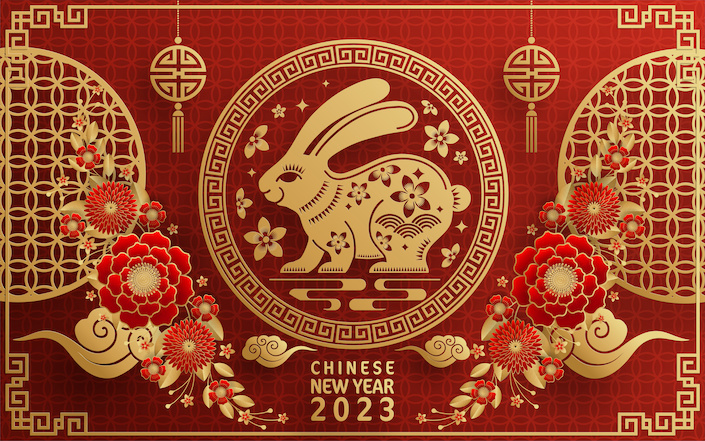
Table of Contents
How is Chinese New Year celebrated?
1. steamed fish | 蒸鱼 | zhēng yú, 2. new year cake | 年糕 | niángāo, 3. spring rolls | 春卷 | chūnjuǎn, 4. fruits | 水果 | shuǐguǒ, 5. dumplings | 饺子 | jiǎozi, 6. “longevity noodles” | 长寿面 | chángshòumiàn, 7. tangyuan | 汤圆 | tāngyuán, 1. 新年快乐 (xīnnián kuàilè) - happy new year, 2. 恭喜发财 (gōngxǐfācái) - may you have a prosperous year, 兔年大吉 (tùnián dàjí) - happy year of the rabbit (2023), 4. 岁岁平安 (suìsuì píng'ān) - may you have peace year after year, 5. 万事如意 (wànshìrúyì) - may all your hopes be fulfilled, 1. no cleaning, 2. no wearing black or white, 3. no cutting hair, 4. no breaking things, why is it called the “lunar” new year, chinese zodiac animal signs, the chinese new year through a local's eyes, chinese vocabulary for the spring festival, join a spring festival celebration and practice your chinese.
Learn Chinese with CLI
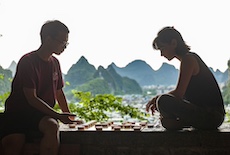
Spring Festival is a time for families to come together, exchange money-filled red envelopes (红包, hóngbāo) , and enjoy delicious Chinese food.
The Chinese New Year is a 15-day holiday and includes a variety of festivities depending on the region and its local traditions and customs. However, certain common customs are shared regardless of region.
For example, it is common practice to decorate one’s home with Chinese lanterns . In many homes, you will find auspicious Chinese characters and couplets on red paper stuck on doors. Red is an auspicious color as it scares away the Nian monster . Wearing new clothes is also a common tradition to ward off bad luck—a new year is a time for newness after all!
View this post on Instagram A post shared by Chinese Language Institute (@studycli)
The Chinese New Year is an important time to 拜年 (bàinián, to pay a new year call), so it is common practice to visit relatives and exchange auspicious greetings and Chinese gifts , including the ever-popular lucky red envelopes filled with Chinese currency . Devoted Buddhist and Daoist practitioners also often visit local temples to welcome the new year.
The holiday has even had an influence on the traditional festivals of other cultures with whom the Chinese have historically interacted, including the Koreans, Vietnamese, Mongolians, and Japanese.
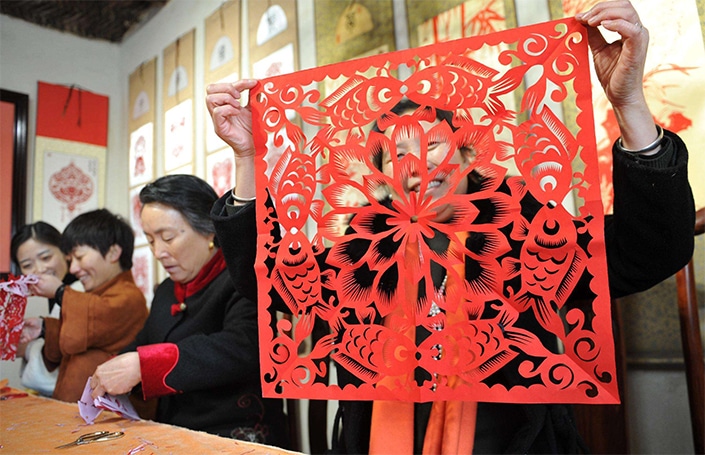
What foods are eaten during Chinese New Year?
Family is of central importance in traditional Chinese culture, and Spring Festival is generally a very family-oriented holiday.
The New Year’s Eve dinner (年夜饭 niányèfàn) kick starts the tradition of family reunions. In fact, the Chinese Spring Festival also marks the world’s largest human migration, as overseas Chinese and Chinese migrant laborers return home to celebrate the advent of the new year alongside their families.
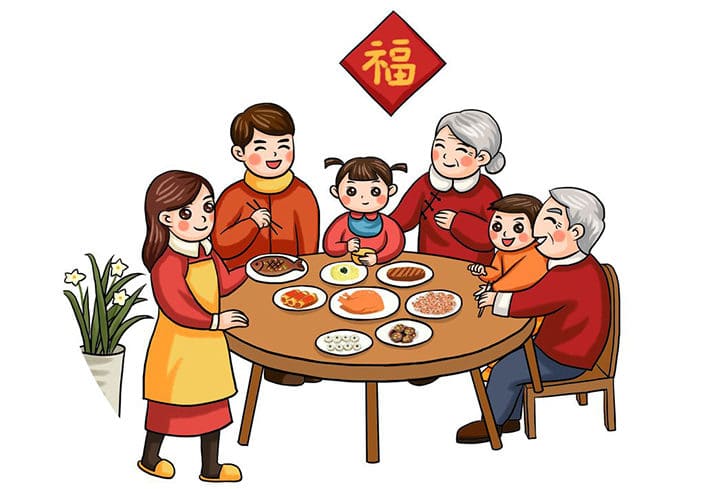
Though traditions can vary between northern and southern China, here are a few examples of common “auspicious foods” presented at reunion dinners:
As you may already know, the Chinese language includes many homophones (同音词 tóngyīncí), which results in many characters and words having the same pronunciation as one another.
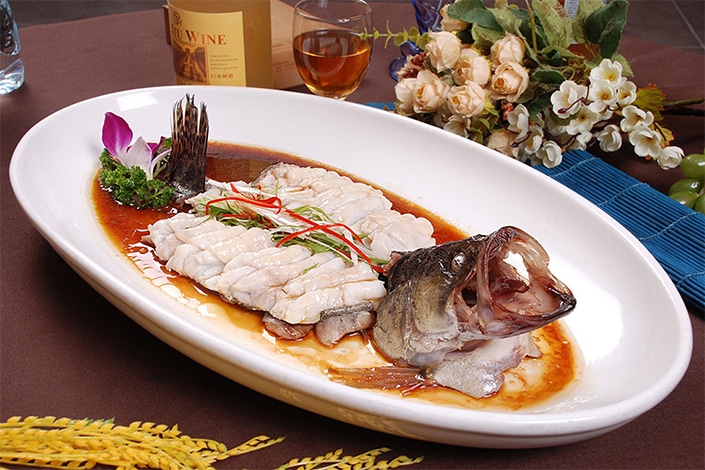
In this instance, “fish” (鱼 yú) has the same pronunciation as “surplus” (余 yú). There is also a typical New Year greeting, 年年有余 (niánnián yǒuyú), which translates to “may you have a surplus (of blessings) every year”. Therefore, eating fish symbolizes an increase in prosperity.
Sticky rice cakes symbolize a prosperous year to come, as “cake” (糕 gāo) has the same pronunciation as “high/lofty” (高 gāo). This coincides with the greeting 年年高升 (niánniángāoshēng; “advance year after year”). Rice cakes are a must during Chinese New Year festivities!
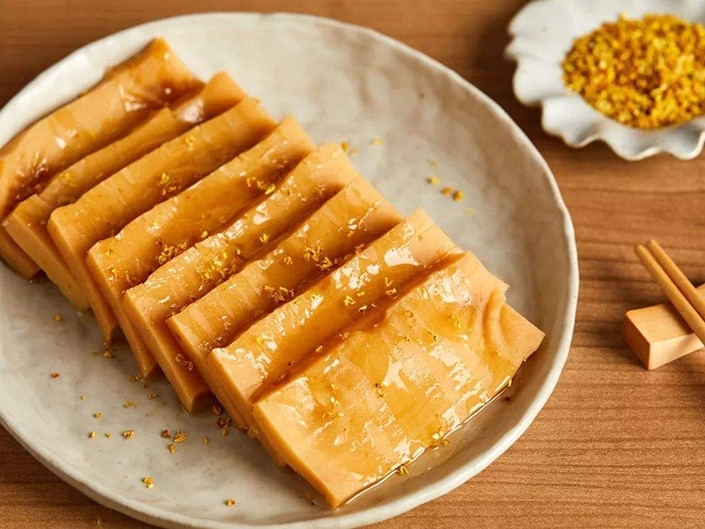
How can you start spring without spring rolls? This delicacy was originally a seasonal food that was consumed only during the spring. Eating spring rolls is a way to welcome the arrival of spring, and their golden color also symbolizes wealth and prosperity.
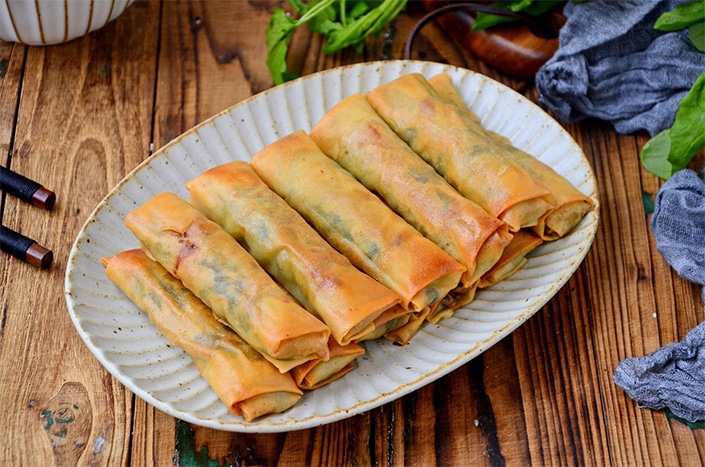
Fruits are commonly enjoyed as desserts and snacks during Spring Festival celebrations. They symbolize life and new beginnings and are also a common new year gift.
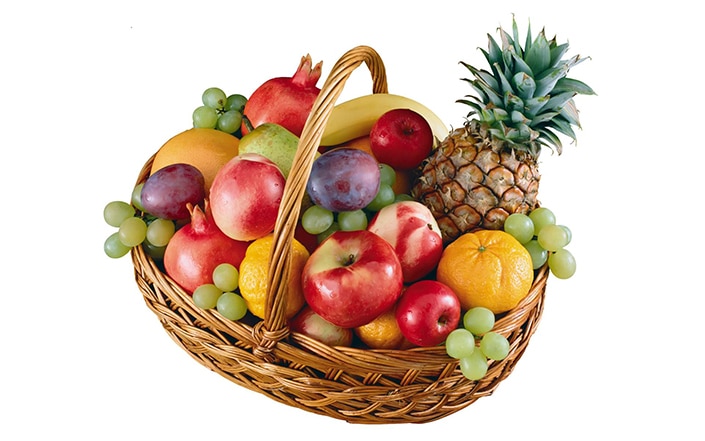
Due to their resemblance to imperial coins (元宝 yuánbǎo), dumplings are representative of wealth and fortune.
“Longevity noodles” are a kind of flat Cantonese egg noodles which are usually consumed during special occasions (such as the Chinese New Year and birthdays).
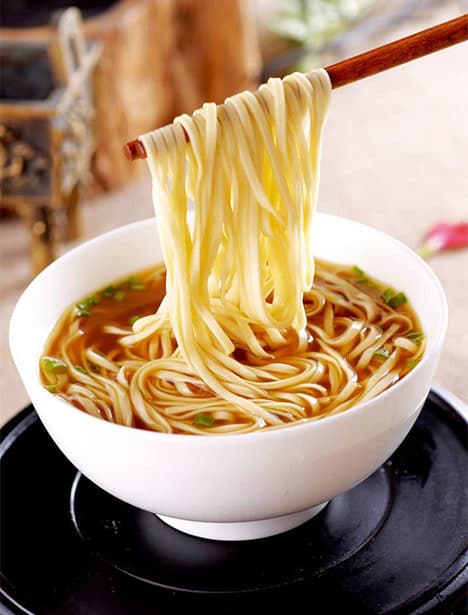
As their name indicates, their long strings represent longevity and living to a ripe old age. The trick is to eat them in a single mouthful and not cut the noodles short!
The fifteenth and final day of the new year holiday is celebrated by the Lantern Festival (元宵节 Yuánxiāojié). During this time, it is common to eat a Chinese dessert called tāngyuán (汤圆), which consists of sweet glutinous rice balls filled with a variety of fillings such as sesame, peanut, and red bean paste. Their round shapes represent togetherness and reunion.
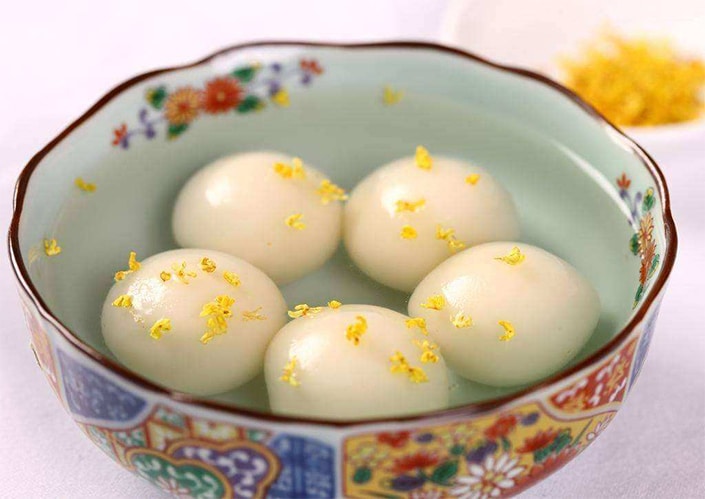
How to Say Happy New Year in Chinese
Would you like to wish a friend, colleague, or loved one Happy New Year in Chinese? Read on to learn this festive phrase and more!
Cultural note: In China, people often hold a fist salute or 抱拳礼 (bàoquánlǐ) when saying the below greetings. Remember that this method of greeting is mainly used during formal occasions, so we suggest to avoid using it during informal encounters!
Saying “Xīnnián Kuàilè” is the simplest and most straightforward way to wish your Chinese friends, family and colleagues a happy new year. Want to know how to pronounce it? Just watch the following video and repeat!
In addition to 新年快乐 (Xīnnián Kuàilè), this is probably the most popular saying you'll hear around the Chinese New Year. It has been the center of many 贺年歌曲 (hènián gēqǔ, Chinese New Year songs) and literally means “congratulations, make a fortune!”
Learn to sing along to the famous Chinese New Year song “恭喜” (gōngxǐ) in the following video.
大吉 (dàjí) is a noun meaning very auspicious or lucky. You can put any given year's zodiac animal year before 大吉 and use it as a general new year greeting. You can also simply say 大吉大利 (dàjídàlì), which means “good luck and great prosperity.”
To learn how to say other year-specific Spring Festival greetings, see the Spring Festival Chinese Vocabulary List toward the bottom of this article.
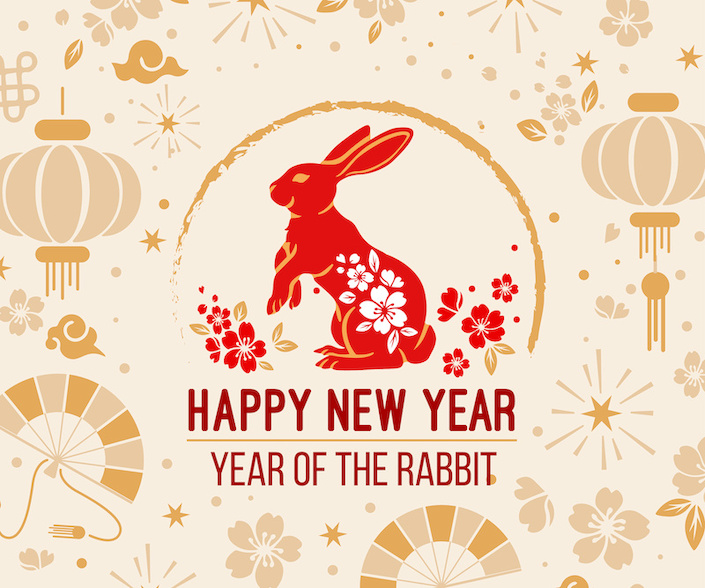
A fun things aspect of Chinese is wordplay based on 同音词 (tóngyīncí, homophones). A great example of this is 岁岁平安. Breaking things during the Chinese new year is a taboo in China as it is believed to bring bad luck resulting in money loss and a family split in the future.
If something does break, you can say “碎碎平安” (suìsuìpíngān) which sounds exactly the same as “岁岁平安” (suìsuìpíngān) . “碎” means to break, whereas “岁” means age or year and is the character used in 岁岁平安. This is a very clever way to negate all that bad luck!
万 literally means “ten thousand” or “a great number.” When you say 万事如意 to your Chinese friends, you are literally wishing that all matters (万事, ten thousand matters/affairs) be according to his/her wishes (如意)。
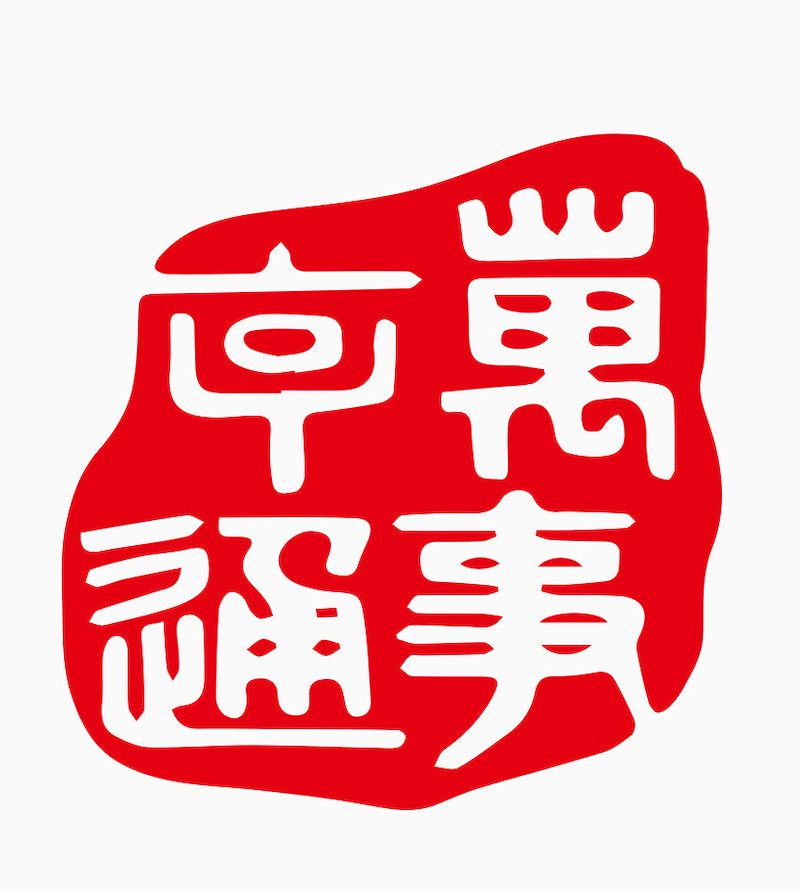
What are some taboos during Spring Festival?
All auspicious things aside, there are certain taboos that must be avoided during Chinese New Year:
Any type of “spring cleaning” must take place before the new year and never during the actual holiday. This allows the cleaned space to be filled with the new blessings and fortunes of the new year. Cleaning during the holiday consequently means that you are getting rid of these new fortunes!
In Chinese color symbolism, black signifies evil and white is the color of death and used for funerals. Instead, auspicious colors such as red and gold are often worn during the new year.
发 fā (hair) is also the character and sound for 发财 fā cái (to get rich), so cutting hair signifies a loss of fortune.
碎 suì means to break, whereas 岁 suì means age or year. If something does break, you can say “碎碎平安” (suì suì píng ān) which sounds exactly the same as “岁岁平安” (“may you have peace year after year”).
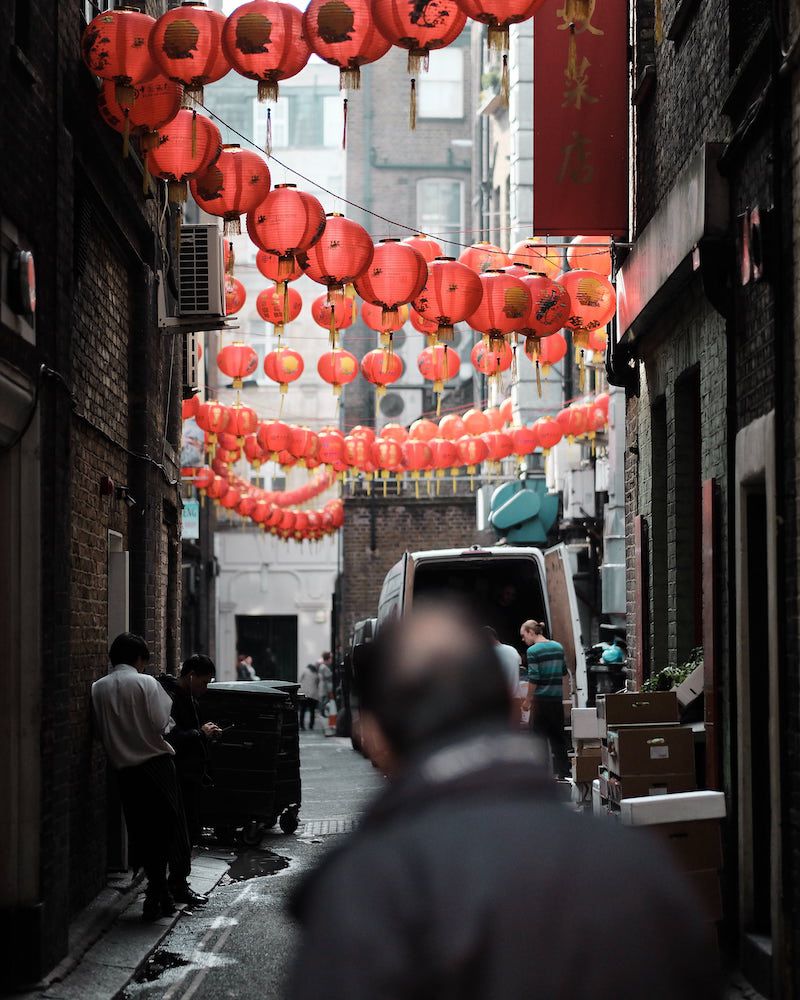
The term “lunar” is an English adaptation, mainly because the holiday starts with the new moon, ends with the full moon 14 days later, and is thus based on the Chinese lunisolar calendar . The name of the holiday in Chinese, 春节 Chūnjié, literally translates to “Spring Festival”.

The Chinese New Year is also a time when the annual zodiac sign changes, meaning that each year is assigned to a specific zodiac animal. Zodiac signs play an integral role in Chinese culture. It is said that your luck regarding financial situations, health and relationships for each year can be calculated based on your zodiac sign.
To ask your Chinese friends and colleagues what their zodiac animal is, just say "你属什么? (nǐ shǔ shénme?)". 属 shǔ can mean “to belong to” or “to be born in the year of". In China, it is common to be asked how old you are or what your 生肖 (shēngxiào, Chinese zodiac sign) is.
In response, you can say: 我属 (wǒ shǔ) + insert animal. For example: “我属牛” (Wǒ shǔ niú, I was born in the Year of the Ox ). Consult CLI's article on the 12 Chinese Zodiac Animals for an in-depth look at this cultural phenomena and to find out what your own zodiac sign is!
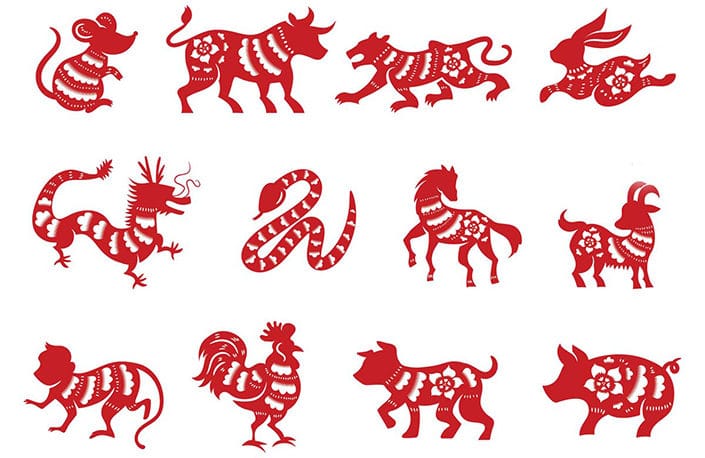
In our Spring Festival video, we invite you to peer into the life of a Guilin resident who walked the same arduous path traveled by so many in China from poverty to prosperity. Join Dayong, a CLI team member since 2009, as he converses with Uncle Ye (叶叔叔, Yè Shūshu) about how his quality of life has changed for the better over the decades.
While watching the video, follow along in this downloadable Chinese-English transcript for the Chinese characters, Chinese pinyin , and English translation.
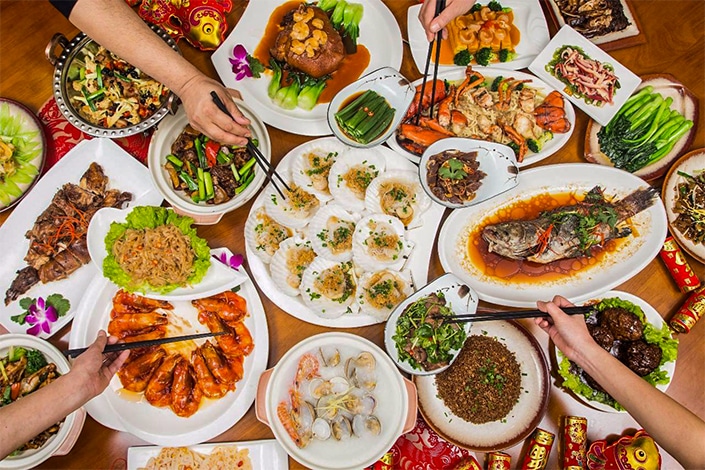
We hope this article helped you learn more about the Chinese New Year! It is truly a fun and festive holiday that is celebrated all across the world. Spring Festival is a time for family reunions, showing appreciation for one’s friends, and delicious feasts.
If you are in China during Spring Festival, we hope you'll get to experience this important holiday for yourself by participating in some Chinese New Year activities with friends or colleagues. Keep in mind that many people will be traveling back and forth during this period as part of the famous Spring Festival travel rush (春运 chūnyùn). If you do plan to go anywhere during this period, especially by train , make sure to buy your tickets far in advance.
If you aren't in China, we encourage you to seek out your local Chinese community, attend holiday events, and even volunteer to help prepare for the Chinese New Year festivities. This is a great way to learn more about Chinese culture and to immerse yourself in the Chinese language .
And now that you know some Chinese New Year greetings, it is time to put them to use! On behalf of the CLI team, we wish you a wonderful Chinese New Year and welcome you to learn Chinese in China . 祝大新年快乐,身体健康,万事如意 !

Free 30-minute Trial Lesson
Continue exploring.
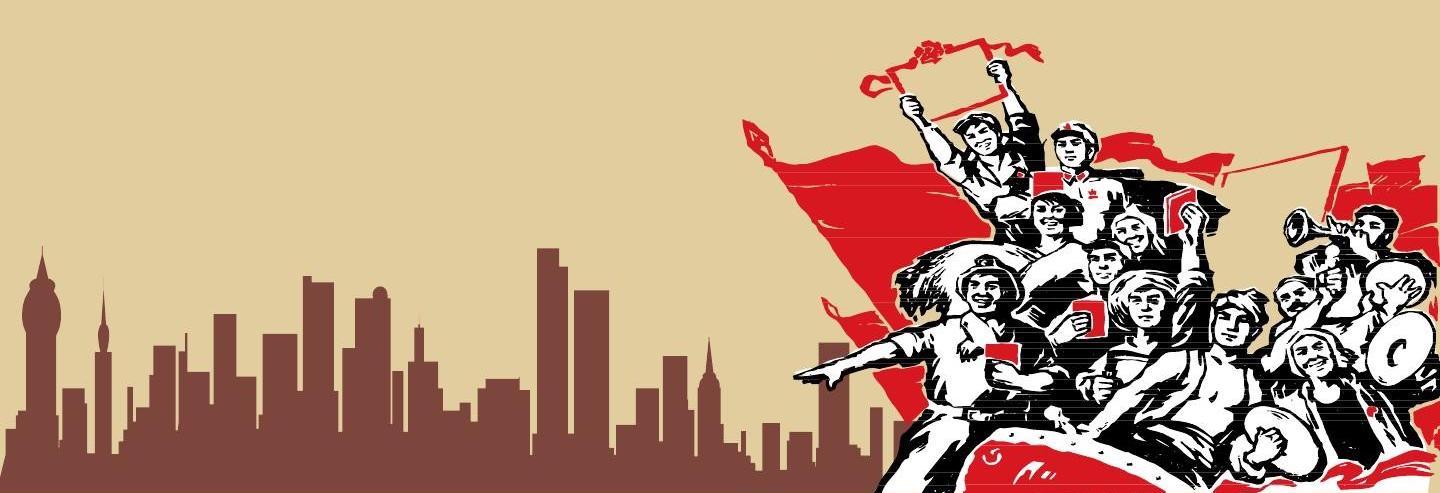
- Chinese Holidays
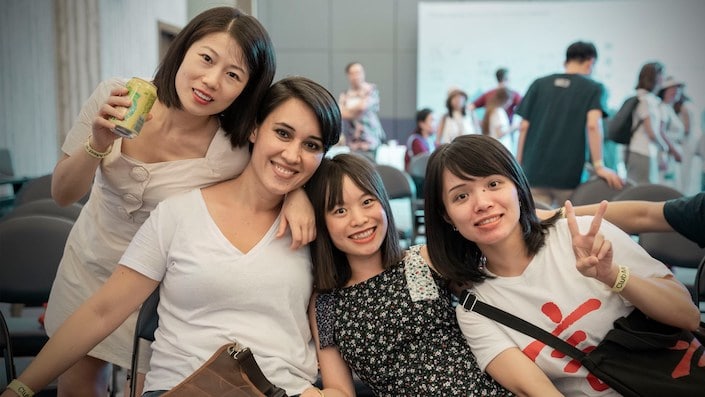
Copyright 2024 | Terms & Conditions | FAQ | Learn Chinese in China
- History Classics
- Your Profile
- Find History on Facebook (Opens in a new window)
- Find History on Twitter (Opens in a new window)
- Find History on YouTube (Opens in a new window)
- Find History on Instagram (Opens in a new window)
- Find History on TikTok (Opens in a new window)
- This Day In History
- History Podcasts
- History Vault
Chinese New Year Traditions
By: History.com Editors
Updated: March 19, 2021 | Original: October 23, 2009

Chinese New Year celebrations were born out of fear and myth. Legend spoke of the wild beast Nian (which also is the word for “year”) that appeared at the end of each year, attacking and killing villagers. Loud noises and bright lights were used to scare the beast away, and the Chinese New Year celebrations were born. Today, the 15-day New Year festivities are celebrated with a week of vacation in metropolitan areas of China. Much like the Western New Year (January 1st), the biggest celebration is on the eve of the holiday. At the turn of the new year, firework displays are put on throughout the city.
Aside from New Year’s Eve, there are other important days of the 15-day Chinese New Year Festival, including:
JIE CAI CENG: Welcoming the Gods of Wealth and Prosperity On the fifth day of New Year’s, it is believed that the gods of prosperity come down from the heavens. Businesses will often participate in setting off firecrackers as they believe it will bring them prosperity and good fortune for their business.
YUAN XIAO JIE: Festival of Lanterns The 15th day of the New Year is known as the Festival of Lanterns and marks the end of the Chinese New Year celebrations. All types of lanterns are lit throughout the streets and often poems and riddles are often written for entertainment.
There are also paper lanterns on wheels created in the form of either a rabbit or the animal of the year (Dog for 2018). The rabbit lantern stems from a Chinese myth or fairytale about a female goddess named Chang E who jumped onto the moon.
So she wouldn’t travel alone, she brought a rabbit with her to keep her company. It is said that if your heart is pure enough, you can see the goddess Chang E and her rabbit on the moon on this day.
Red envelopes Called “hong bao” in Mandarin, the red envelopes filled with money are typically only given to children or unmarried adults with no job. If you’re single and working and making money, you still have to give the younger ones the hong bao money.
The color red denotes good luck/fortune and happiness/abundance in the Chinese Culture and is often worn or used for decoration in other celebrations.
Dragon The dragon is present in many Chinese cultural celebrations as the Chinese people often think of themselves as descendants of the mythical creature. On the fifth day of the New Year when many people have to start going back to work, they will also have dancing dragons perform in the front of the office building.
On the 15th day of the New Year (Yuan Xiao Jie), they may also have a lot of dancing dragon performances. The dragon represents prosperity, good luck and good fortune.
Traditional Foods
The Chinese New Year’s Eve meal is the most important dinner of the year. Typically, families gather at a designated relative’s house for dinner, but these days, many families often celebrate New Year’s Eve dinner at a restaurant. Many restaurants require reservations months in advance.
There are also some families that hire a professional chef to come cook at their house. Chefs are often busy running from one home to another cooking dinners for different families on New Year’s Eve.
Chinese New Year is a 15-day celebration and each day, many families rotate celebrations between homes of their relatives. The festivities are day-long and sometimes, a family ends up cooking two meals for their relatives, once at lunch and once at dinner.
These dishes used to be all made from scratch, but now people can easily buy them prepackaged at the supermarkets.
- Eight Treasures Rice, which contains rice, walnuts, different colored dry fruit, raisins, sweet red bean paste, jujube dates, and almonds
- “Tang Yuan” – black sesame rice ball soup; or a won ton soup
- Chicken, duck, fish and pork dishes
- “Song Gao,” literally translates to “loose cake,” which is made of rice which has been coarsely ground and then formed into a small, sweet round cake
- “Jiu Niang Tang” – sweet wine-rice soup which contains small rice balls
READ MORE: Chinese New Year History

Sign up for Inside History
Get HISTORY’s most fascinating stories delivered to your inbox three times a week.
By submitting your information, you agree to receive emails from HISTORY and A+E Networks. You can opt out at any time. You must be 16 years or older and a resident of the United States.
More details : Privacy Notice | Terms of Use | Contact Us
- Entertainment
- Environment
- Information Science and Technology
- Social Issues
Home Essay Samples Life
Essay Samples on Chinese New Year
Chinese new year celebration: lion dance performances.
Chinese nuances are still felt today. By the way, do you know that one show is always enlivening the Lunar New Year? The answer is lion dance. Yup! The cheap entertainment that emerged and became one of the traditional Chinese arts is indeed enough to...
- Chinese Culture
- Chinese New Year
The Request for Approval on the Chinese New Year
When one mentions Chinese New Year (CNY), it is hard for one to not think of the joy from the numerous Ang Baos received from relatives during house-visiting sessions. Yet, such happiness comes together with the incessant questions, especially about marriage, from our aunts and...
The Peak of Chinese Culture in the Chinese New Year
This research paper aims to compare the Chinese culture with Europe. Especially in terms of business, providing some examples of traditional Chinese norms when you are going to negotiate with a Chinese company that is important to take into account. To continue, with the help...
The Favorite Festival of Everyone, Chinese New Year
If you ask me what is my most favorite festival, of course, it would be the Chinese New Year, or Spring Festival, which was the most important festival in China that symbolized the beginning of another brand new year. At this time of the year,...
Best topics on Chinese New Year
1. Chinese New Year Celebration: Lion Dance Performances
2. The Request for Approval on the Chinese New Year
3. The Peak of Chinese Culture in the Chinese New Year
4. The Favorite Festival of Everyone, Chinese New Year
Stressed out with your paper?
Consider using writing assistance:
- 100% unique papers
- 3 hrs deadline option
- Career Goals
- Perseverance
- Personal Experience
- Affordable Housing
- Coming of Age
Need writing help?
You can always rely on us no matter what type of paper you need
*No hidden charges
100% Unique Essays
Absolutely Confidential
Money Back Guarantee
By clicking “Send Essay”, you agree to our Terms of service and Privacy statement. We will occasionally send you account related emails
You can also get a UNIQUE essay on this or any other topic
Thank you! We’ll contact you as soon as possible.
Home / Essay Samples / Culture / Holidays / Chinese New Year
Chinese New Year Essay Examples
Chinese reunion dinner: celebrating family and tradition.
Chinese New Year is known to be full of peace and a cheerful holiday that is normally celebrated for the first fifteen days of the year. It is also known to be days of family reunion when all family members would finally come back home...
Barongsai: Chinese New Year Celebration in Indonesia
Maybe you often hear about Chinese New Year or Tahun baru imlek, the Chinese community in Indonesia always celebrate Imlek every year. By the way, do you know that there is one show which is always enlivening the Chinese New Year in Indonesia? Yup! The...
Analysis of the Behavior and Rituals of My Family for the Chinese New Year
In this essay, I will be using Geertz’s interpretive methodology to analyse the behaviour and rituals practiced by my family during reunion dinners at Chinese New Year. Having been involved in this social gathering since young, I can draw many observations and conclusions about the...
The Positive and Negative Effects of the Chinese New Year
The first high-quality of Chinese new for social and lifestyle is to let people comprehend greater about the New Year’s regular culture, have a deeper grasp of the New Year’s traditions and culture, and hold the normal culture of the New Year, and via the...
Trying to find an excellent essay sample but no results?
Don’t waste your time and get a professional writer to help!

You may also like
- American Culture
- Chinese Culture
- Indian Culture
- Multiculturalism
- Valentines Day
- Western Culture
- Diwali Essays
- Spring Break Essays
- Thanksgiving Essays
- Christmas Essays
- Holi Festival Essays
- Day of The Dead Essays
- Winter Break Essays
- New Year Essays
- Cinco De Mayo Essays
- 4Th of July Essays
samplius.com uses cookies to offer you the best service possible.By continuing we’ll assume you board with our cookie policy .--> -->